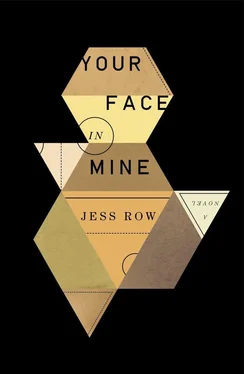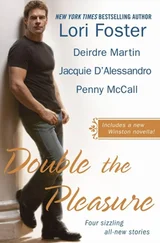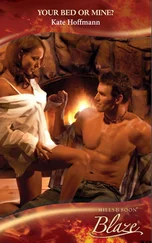—
The standard explanation I’ve given myself is simple: when I heard the words from Cheryl, when she called from the hospital, my mind went black, my throat filled with cold sand, I nearly passed out, and it wasn’t until hours later that I realized I’d never said to her, but I saw him only half an hour before that. It wasn’t a conscious omission. It wasn’t an omission at all. I had lost my mind; I had lost my memory; all I was thinking of was how to live the next seventy-two hours, how to make it to the funeral.
As it turned out, it fell to me to drive Cheryl and Rebecca there. She wasn’t able to drive herself, she said; she couldn’t be trusted behind the wheel, after two days of Valium- and doxepin-induced sleep. They sat in the backseat, as if I were the chauffeur: collapsed against either door, their black dresses folded about them, like dying crows. Rebecca and I nearly carried Cheryl into the service; Rabbi Kauffmann and I nearly carried her back out again. She clung to my neck like a cramping swimmer reaching up for air. She said, you were his better self. If only he had listened to you more. She said, something of him lives on in you.
Afterward, because there was no wake, because we were all back from college and hadn’t seen one another and needed to confirm, as all mourners do, that we were still alive, Ayala and I and Rina and Trevor and Jake spread the word that we should gather at Kanazawa, the nearest place we could think of to the funeral home. Martin was there, of course. I hadn’t seen him in eighteen months. I wouldn’t see him again for eighteen years. He wore black jeans and a black polo shirt with a navy jacket over it, an outfit so frighteningly ugly it almost seemed it had been planned that way. His face looked like it had been scrubbed with a Brillo Pad: exceedingly pale and raw, which made his nose seem larger, or perhaps he was having a late growth spurt. At the entrance to the chapel we’d hugged, awkwardly, a first in our lives. Thank god, I’d said, thank god you’re here, and he said, why wouldn’t I be? Why wouldn’t I be, Kelly? But then the music had started — the first song was “Freak Scene,” by Dinosaur Jr., from a mix tape Alan had made for Rebecca just a week before — and I hadn’t had to answer.
There was no table large enough for us, so the waitress gave us the tatami room in the back, and we took off our shoes, gamely, and sat cross-legged, as if we were kindergarteners again, playing duck, duck, goose, and ordered large bottles of sake, proving once and for all that we were sophomores in college. I sat at one end of the long table, and Martin at the other, saving us from having to talk to each other.
Why did I think we were angry with each other? We had fallen so thoroughly out of contact that it seemed there must be a reason, though we’d never fought, or even disagreed, since the band broke up. Maybe it was still that. That could have been the reason I gave myself. But the look he gave me wasn’t the wariness of an old wound; it was fresh outrage. As if he wanted some kind of an answer. Finally, I thought: he blames me for not seeing it coming. For not warning Cheryl. For being too busy being who I was supposed to be, for not dropping out, if that’s what you would call it, for not going into full-time mourning before the fact. For not being self-evidently shattered. And I thought: fuck you, Martin. Fuck you and get me out of here. At the end of the meal we hugged once again, even more awkwardly than the first time, our arms curved into stiff hoops like jai alai baskets. I’ll see you, he said, and ambled down the sidewalk in the opposite direction of the parking lot.
—
I’ve lived with this guilt for so long — nearly twenty years — that I’ve accepted it as a condition of living, a solid vestigial node, like a tumor, like a bullet lodged near my spine. Has it cast its own pall over my life? Of course. Is there a certain relief in knowing that someone else knows?
There would be, if that person was an impartial listener. A therapist. Wendy. Why, again, did I never tell Wendy? Not because I was afraid she’d betray me; because she would have been appalled that I avoided the consequences. To her the shame would have been unbearable. She would have wanted me to confess.
Did I say I’ve been living in white dreamtime? The time in which all crimes are historical. Back then. Lessons learned. Things are different now. Who would have thought that history could whip around, like a dangling snake, and bite me across the knuckles? He owns me, I’m thinking. His way or three to five in Jessup. Of all the ways I expected to be transformed by grief, by loss, by a catastrophic personal loss over which I had no control , this was never one.
The thing about blind spots, someone told me once, is you don’t see them.
—
So listen, Cox’s voice is saying now, on my voice mail, which I’m only listening to now, having fished my phone out of my jacket to charge it before bed. I found something. Took me nearly a month to confirm it, but here we are. Martin Lipkin, aka Matthew Wilson, aka Mark Wilbury, aka Wilbur Martinson, Internet aliases including BodyMore, Grnmnt10234, XcashKingX, and Alan93. Served eighteen months at Northern State Penitentiary in St. Johnsbury, Vermont. November 1998 to May 2000. Credit card fraud. Identity theft. Story was, he worked for a business that leased ATMs to gas stations, and figured out a way to get the card numbers out of the machines in his spare time. Pretty minor-league stuff. Or it would have been, if the purchases hadn’t been so large. He maxed out every card he found — tens of thousands of dollars, maybe two hundred thousand altogether. Strange thing was, the purchases were all overseas. No cars, no jewelry, no Xboxes or WaveRunners. Nothing that could be seized. In fact, the D.A. never discovered what it was he was buying at all. That’s why he served his full sentence. Kid had no traceable assets, nothing with which to pay a fine. Of course, insurance covered the banks’ losses. Probably ruined a few people’s credit ratings, though. And after release, he skipped parole and disappeared. There’s still a warrant out for him in the state of Vermont.
—
I need to hide, I can’t help thinking, I need to leave, I need a conduit, a way out. I need to become not me. As I settle back into bed, beyond sleep, I feel myself grasping Martin’s hand at the edge of a cliff, the wind behind us, straining my calves to stay upright, and then, by some wordless signal, we jump at the same moment, jump over the thick shining waves, the stone-dark bottomless ocean.
Out of a dream of my childhood, a hike up Mount Cardigan on a bright autumn day, scampering up a long granite face at a gentle incline, bursts of October light filtering through canopies of yellow and red and orange — I open my eyes to the sun streaming through a gauzy curtain above my bed, the shutters drawn back, the branches of a rubber tree thrusting up into a pale sky strewn with jet trails.
Five or six different species of birds are singing all at once, competitively, trying to drown one another out. An avian pep rally. It’s the sound of mid-morning, they’re saying, the day fully established, the hard business of seed cracking and grub probing under way, and I look down at my watch and see 10:30 . Someone should have come to get me by now.
But since they haven’t, since the day seems unscheduled — not that Martin ever gave me an itinerary, an agenda, not that I have any proof of being here other than a stamp in my passport and a boarding pass jammed into a shirt pocket — I sit up in bed and take a long breath, a waking breath, whatever that means. When you wake up in a new country, I’m thinking now, your senses are the sharpest. Newness, to the touch, to the nose, to the tongue, is a series of small insults. I ought to be paying full attention. I’m on retainer, after all: a professional visitor. A professional writer . Why is that so hard to say? I should be taking everything down.
Читать дальше













